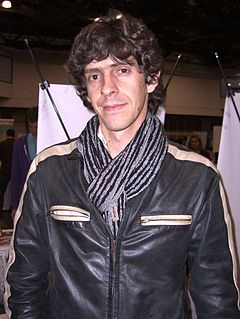A Quote by Diana Gabaldon
Each book develops a strong organic shape. And when that shape is complete, the book is complete. I don't know where the end is. I don't start at the beginning. It's like playing Tetris in my head in a very slow kind of way. All the shapes join up.
Related Quotes
Keep a diary, but don't just list all the things you did during the day. Pick one incident and write it up as a brief vignette. Give it color, include quotes and dialogue, shape it like a story with a beginning, middle and end—as if it were a short story or an episode in a novel. It's great practice. Do this while figuring out what you want to write a book about. The book may even emerge from within this running diary.
After all, is it not the way we humans shape the universe, shape time itself? Do we not take the raw stuff of chaos and impose a beginning, middle, and end on it, like the simplest and most profound of folktales, to reflect the shapes of our own tiny lives? And if the physicists are right, that the physical world changes as it is observed, and we are its only known observers, then might we not be bending the entire chaotic universe, the eternal, ever-active Now, to fit that familiar form?
When people say "How do you write a book, how does it all happen?" I say, you line things up, and you line them up as actually as you possibly can, but sooner or later the book has got momentum and it's moving along under that momentum. It's like a sculpture, if you're working with the grain of the wood, the wood will start defining what shape it's going to become.
People come, people go – they’ll drift in and out of your life, almost like characters in a favorite book. When you finally close the cover, the characters have told their story and you start up again with another book, complete with new characters and adventures. Then you find yourself focusing on the new ones, not the ones from the past.
When you're writing a book, it's rather like going on a very long walk, across valleys and mountains and things [...] The highest mountain on the walk is obviously the end of the book, because it's got to be the best view of all, when everything comes together and you can look back and see that everything you've done all ties up. But it's a very, very long, slow process.
I love the book. I love the feel of a book in my hands, the compactness of it, the shape, the size. I love the feel of paper. The sound it makes when I turn a page. I love the beauty of print on paper, the patterns, the shapes, the fonts. I am astonished by the versatility and practicality of The Book. It is so simple. It is so fit for its purpose. It may give me mere content, but no e-reader will ever give me that sort of added pleasure.
Any time I put together a story collection, I don't know what it's going to look like overall - or even what the title story is going to be. Over time, I end up with a dozen or so stories, and I start to see a shape to them, how they fit together, and then I write stories that complement or extend that shape.

































